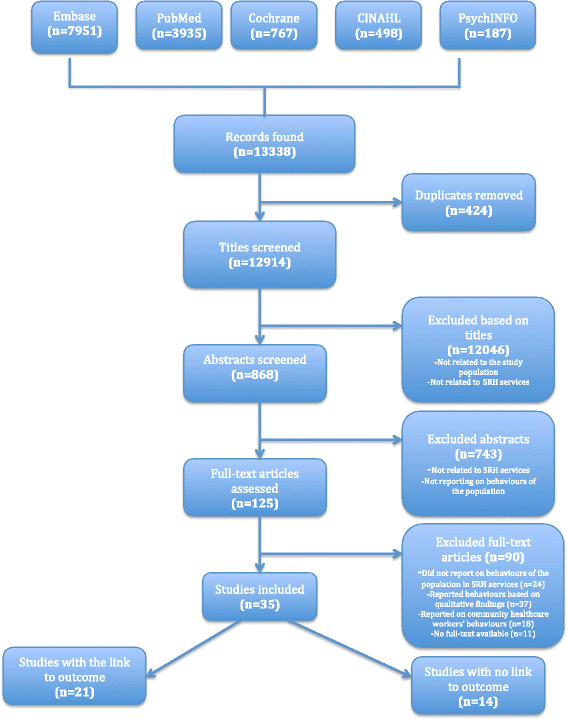Healthcare workers' behaviors and personal determinants associated with providing adequate sexual and reproductive healthcare services in sub-Saharan Africa: a systematic review
- PMID: 28288565
- PMCID: PMC5348841
- DOI: 10.1186/s12884-017-1268-x
Healthcare workers' behaviors and personal determinants associated with providing adequate sexual and reproductive healthcare services in sub-Saharan Africa: a systematic review
Abstract
Background: Healthcare workers may affect the utilization of sexual and reproductive healthcare (SRH) services, and quality of care thereof, for example by their behaviours or attitudes they hold. This can become a hindrance to accessing and utilizing SRH services, particularly by young people, and thus a better understanding of these behaviours and associated factors is needed to improve access to and utilization of SRH services.
Methods: A systematic review of literature was conducted to identify studies focusing on healthcare workers' behaviors and personal determinants associated with providing adequate SRH services in sub-Saharan Africa (January 1990 - October 2015). Five databases were searched until 30th October 2015, using a search strategy that was adapted based on the technical requirements of each specific database. Articles were independently screened for eligibility by two researchers. Of the 125-screened full-text articles, 35 studies met all the inclusion criteria.
Results: Negative behaviours and attitudes of healthcare workers, as well as other personal determinants, such as poor knowledge and skills of SRH services, and related factors, like availability of essential drugs and equipment are associated with provision of inadequate SRH services. Some healthcare workers still have negative attitudes towards young people using contraceptives and are more likely to limit access to and utilization of SRH by adolescents especially. Knowledge of and implementation of specific SRH components are below optimum levels according to the WHO recommended guidelines.
Conclusions: Healthcare workers' negative behaviours and attitudes are unlikely to encourage women in general to access and utilize SRH services, but more specifically young women. Knowledge of SRH services, including basic emergency obstetric care (EmOC) is insufficient among healthcare workers in SSA.
Trial registration: A protocol for this systematic review was registered with PROSPERO and the registration number is: CRD42015017509 .
Keywords: Adolescent health; Child health; Healthcare services; Healthcare worker behaviour; Maternal health; Personal determinants; Sexual and reproductive healthcare; Systematic review.
Figures
Similar articles
-
Factors influencing access to and utilisation of youth-friendly sexual and reproductive health services in sub-Saharan Africa: a systematic review.Reprod Health. 2021 Jun 27;18(1):135. doi: 10.1186/s12978-021-01183-y. Reprod Health. 2021. PMID: 34176511 Free PMC article.
-
Factors that influence the provision of intrapartum and postnatal care by skilled birth attendants in low- and middle-income countries: a qualitative evidence synthesis.Cochrane Database Syst Rev. 2017 Nov 17;11(11):CD011558. doi: 10.1002/14651858.CD011558.pub2. Cochrane Database Syst Rev. 2017. PMID: 29148566 Free PMC article.
-
Are facility service delivery models meeting the sexual and reproductive health needs of adolescents in Sub-Saharan Africa? A qualitative evidence synthesis.BMC Health Serv Res. 2025 Feb 1;25(1):193. doi: 10.1186/s12913-025-12344-1. BMC Health Serv Res. 2025. PMID: 39893420 Free PMC article.
-
Understanding sexual and reproductive health need of unmarried adolescents and youth in urban slums: evidence from a formative study in Uttar Pradesh, India.Reprod Health. 2025 Jun 19;22(1):103. doi: 10.1186/s12978-025-02025-x. Reprod Health. 2025. PMID: 40537765 Free PMC article.
-
Home treatment for mental health problems: a systematic review.Health Technol Assess. 2001;5(15):1-139. doi: 10.3310/hta5150. Health Technol Assess. 2001. PMID: 11532236
Cited by
-
Structural violence in South African primary healthcare facilities: insights from discussions with adolescents and young people seeking sexual and reproductive health needs.Int J Qual Stud Health Well-being. 2022 Dec;17(1):2056955. doi: 10.1080/17482631.2022.2056955. Int J Qual Stud Health Well-being. 2022. PMID: 35341478 Free PMC article.
-
Youth-friendly sexual and reproductive health services utilization and its determinants in Ethiopia: A systematic review and meta-analysis.Heliyon. 2021 Dec 3;7(12):e08526. doi: 10.1016/j.heliyon.2021.e08526. eCollection 2021 Dec. Heliyon. 2021. PMID: 34934842 Free PMC article.
-
Early Resumption of Sexual Intercourse and Its Associated Factors Among Postpartum Women in Western Ethiopia: A Cross-Sectional Study.Int J Womens Health. 2020 May 6;12:381-391. doi: 10.2147/IJWH.S231859. eCollection 2020. Int J Womens Health. 2020. PMID: 32440232 Free PMC article.
-
Emergency obstetric care provision in Southern Ethiopia: a facility-based survey.BMJ Open. 2017 Nov 8;7(11):e018459. doi: 10.1136/bmjopen-2017-018459. BMJ Open. 2017. PMID: 29122802 Free PMC article.
-
A mixed reception: perceptions of pregnant adolescents' experiences with health care workers in Cape Town, South Africa.Reprod Health. 2021 Aug 4;18(1):167. doi: 10.1186/s12978-021-01211-x. Reprod Health. 2021. PMID: 34348728 Free PMC article.
References
-
- Kuruvilla S, Bustreo F, Kuo T, Mishra CK, Taylor K, Fogstad H, Gupta GR, Gilmore K, Temmerman M, Thomas J, Rasanathan K. The Global strategy for women’s, children’s and adolescents’ health (2016–2030): a roadmap based on evidence and country experience. Bull World Health Organ. 2016;94(5):398–400. doi: 10.2471/BLT.16.170431. - DOI - PMC - PubMed
-
- The World Health Organization (WHO), UN Sustainable Development Summit 2015. http://www.who.int/mediacentre/events/meetings/2015/un-sustainable-devel.... Accessed on 09 Feb 2016.
-
- World Health Organization (WHO). Maternal, newborn, child and adolescent health. http://www.who.int/maternal_child_adolescent/topics/maternal/adolescent_.... Accessed on 14 Jan 2016.
Publication types
MeSH terms
Substances
LinkOut - more resources
Full Text Sources
Other Literature Sources
Medical
Research Materials
Miscellaneous


